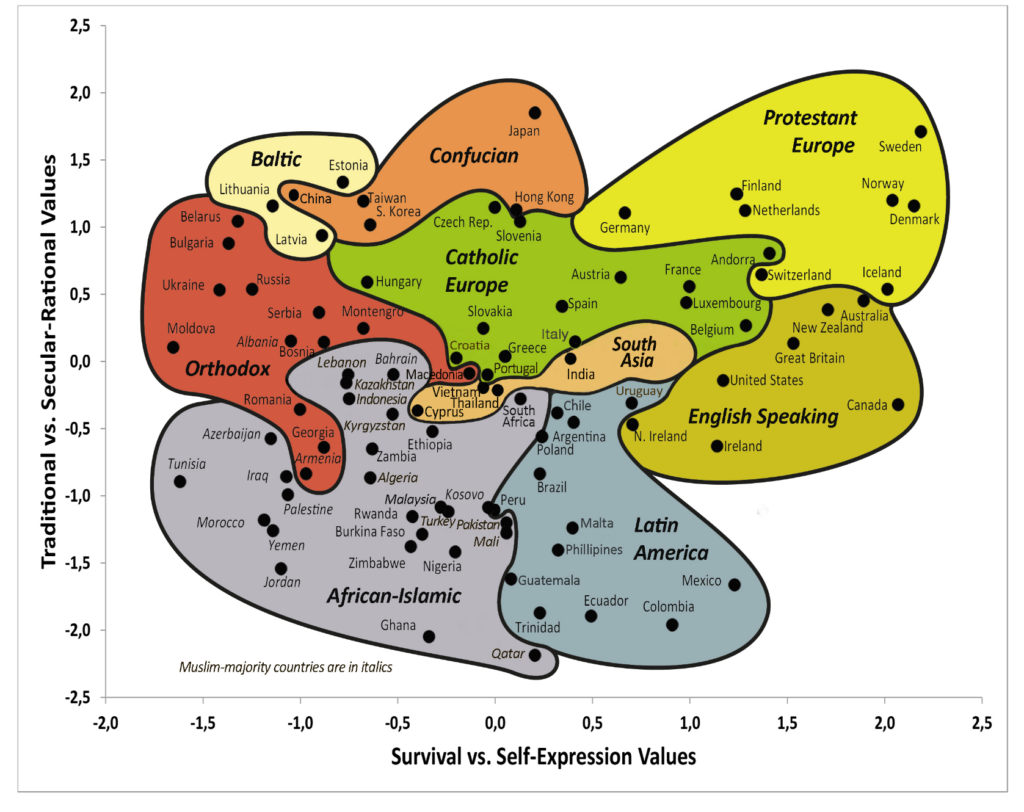The desire for free choice and autonomy is a universal human aspiration, but it is not top priority when people grow up feeling that survival is uncertain, the World Values Survey observes. As long as physical survival remains uncertain, the desire for physical and economic security tends to take higher priority than democracy.
The final dataset for Wave 7 of the Joint World Values Survey and the European Values Study covering 100 societies was released this week. WVS surveys have confirmed that people’s beliefs and values are a key factor in the emergence and flourishing of democratic institutions, economic development, gender equality, and the extent to which societies have effective government.
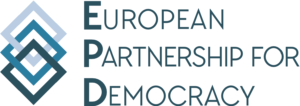 Data from the World Values Survey show that support for “emancipative” values focused on individual choice and equality has been rising across the globe to the detriment of values focused on conformity and deference, notes Ken Godfrey, the executive director of the European Partnership for Democracy. This finding, along with others like it, paints a picture of people slowly but surely turning toward values that provide the social underpinnings for democracy. While the opinions of the public on their own do not dictate the nature of a regime, they are hard to ignore over the long run, he writes for Carnegie Europe.
Data from the World Values Survey show that support for “emancipative” values focused on individual choice and equality has been rising across the globe to the detriment of values focused on conformity and deference, notes Ken Godfrey, the executive director of the European Partnership for Democracy. This finding, along with others like it, paints a picture of people slowly but surely turning toward values that provide the social underpinnings for democracy. While the opinions of the public on their own do not dictate the nature of a regime, they are hard to ignore over the long run, he writes for Carnegie Europe.
Democratic decline is evident not just in the function of free societies, but in public support for the “liberalism, in the free-market European sense” (in the words of economist Deirdre McCloskey) that corresponds most closely with limited government, protections for individual rights, and prosperity, J.D. Tuccille writes for Reason.
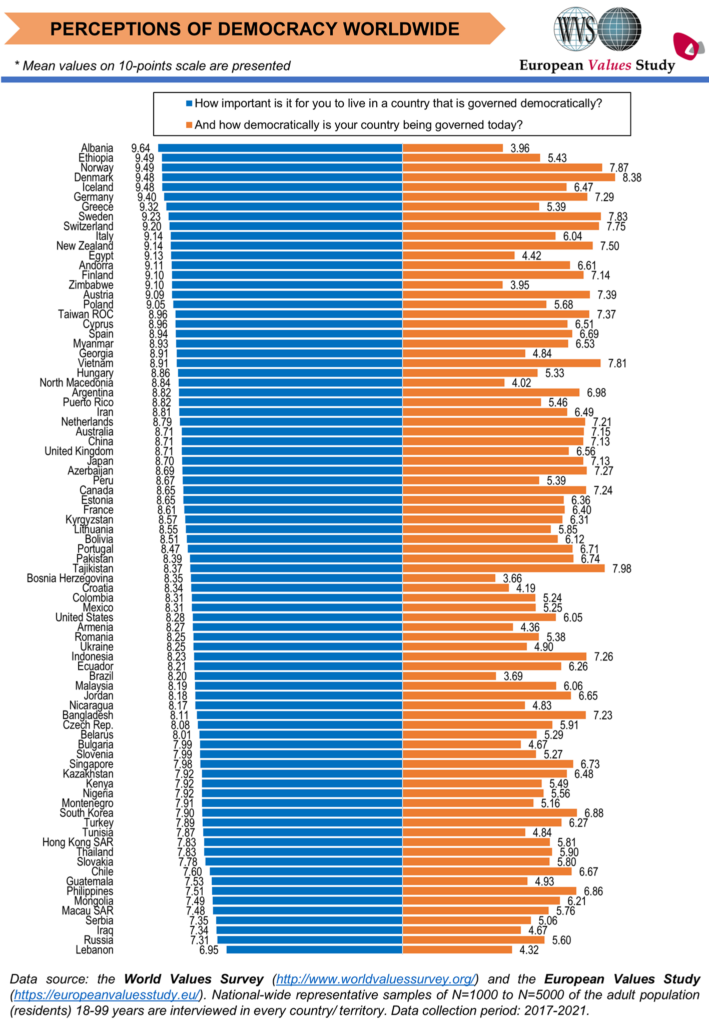 “The [previous] World Values Survey (which covers 77 countries) demonstrates that less than half (47.4 percent) of all respondents believe democracy is important, down from 52.4 per cent in 2017. This is a worrying drop, especially since less than half believe that having a democracy is ‘very good’,” adds International IDEA.
“The [previous] World Values Survey (which covers 77 countries) demonstrates that less than half (47.4 percent) of all respondents believe democracy is important, down from 52.4 per cent in 2017. This is a worrying drop, especially since less than half believe that having a democracy is ‘very good’,” adds International IDEA.
What sort of government would people prefer? Tuccille asks. A whopping 52 percent now say they favor “a strong leader who does not have to bother with parliament or elections”—up from 38 percent in 2009.
Why the future is democratic after all
When basic physiological and safety needs are fulfilled there is a growing emphasis on self-expression values. Findings from the WVS demonstrate that mass self-expression values are extremely important in the emergence and flourishing of democratic institutions in a society, the WVS adds:
With industrialization and the rise of postindustrial society, generational replacement makes self-expression values become more wide spread and countries with authoritarian regimes come under growing mass pressure for political liberalization. This process contributed to the dramatic Third Wave Democracy in the late 1980s and early 1990s and is one of the factors contributing to more recent processes of democratization.
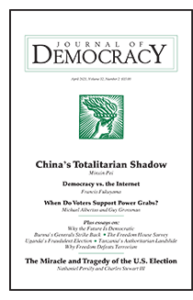 But accounts of democratic backsliding neglect the cultural foundations of autocracy-versus-democracy, WVS Vice-President Christian Welzel wrote in “Why the future is democratic,” the most read essay of the Journal of Democracy in 2021. He argued that:
But accounts of democratic backsliding neglect the cultural foundations of autocracy-versus-democracy, WVS Vice-President Christian Welzel wrote in “Why the future is democratic,” the most read essay of the Journal of Democracy in 2021. He argued that:
1) countries’ membership in culture zones explains some 70 percent of the total cross-national variation in autocracy-versus-democracy; and
2) this culture-bound variation has remained astoundingly constant over time—in spite of all the trending patterns in the global distribution of regime types over the last 120 years.
Both the direction and the extent of regime change are a function of glacially accruing regime-culture misfits—driven by generational value shifts in a predominantly emancipatory direction, he observed:
Consequently, the backsliding of democracies into authoritarianism is limited to societies in which emancipative values remain underdeveloped. Contrary to the widely cited deconsolidation thesis, the ascendant generational profile of emancipative values means that the momentary challenges to democracy are unlikely to stifle democracy’s long-term rise.
Human development strengthens civil society, political liberties, good governance, and gender equality – and makes democracy increasingly likely, where it does not yet exist, and increasingly responsive, where it already exists. Self-expression values play a major role in this process, the WVS adds:
- Secular-rational values and materialism were formulated by philosophers and the left-wing politics side in the French revolution, and can consequently be observed especially in countries with a long history of social democratic or socialistic policy, and in countries where a large portion of the population have studied philosophy and science at universities.
- Survival values are characteristic for eastern-world countries and self-expression values for western-world countries. In a liberal post-industrial economy, an increasing share of the population has grown up taking survival and freedom of thought for granted, resulting in that self-expression is highly valued.
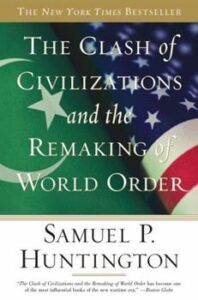 Though initially unpersuaded by the pessimistic forecast of inevitable conflict in Samuel Huntington’s Clash of Civilizations, Chinese intellectuals have come to judge the book’s thesis about the geopolitical importance of civilizations and cultures to be correct, Dutch sociologist Eric Hendriks-Kim writes for First Things:
Though initially unpersuaded by the pessimistic forecast of inevitable conflict in Samuel Huntington’s Clash of Civilizations, Chinese intellectuals have come to judge the book’s thesis about the geopolitical importance of civilizations and cultures to be correct, Dutch sociologist Eric Hendriks-Kim writes for First Things:
Huntington’s strongly “culturalist” angle, which accords religion and cultural values superordinate roles, reinforces China’s official self-understanding. CCP propaganda consistently plays the culture card, arguing that China should not become a Western-style liberal democracy, because to do so would go against China’s cultural values. Huntington argues that cultures should respect each other’s political systems and manage differences rather than attempt to eradicate them.
“Huntington criticized Western political theory for its dogmatic ideological belief that liberal democratic governments represent the highest political ideal,” said Jiang Shigong, a prominent Chinese political theorist and public intellectual.
Post-industrialization brings emancipation from both traditional and secular authority, giving rise to an emancipative ethos. This is why liberal democracy becomes the prevailing political system in postindustrial societies, the WVS states:
The linkage between the rise of the service sector and the strength of self-expression values is replicated at the individual level. Within any given society, those with higher incomes, higher education, and jobs in the service sector tend to emphasize self-expression values more strongly than the rest of their compatriots, falling higher and to the right of them on this map.
